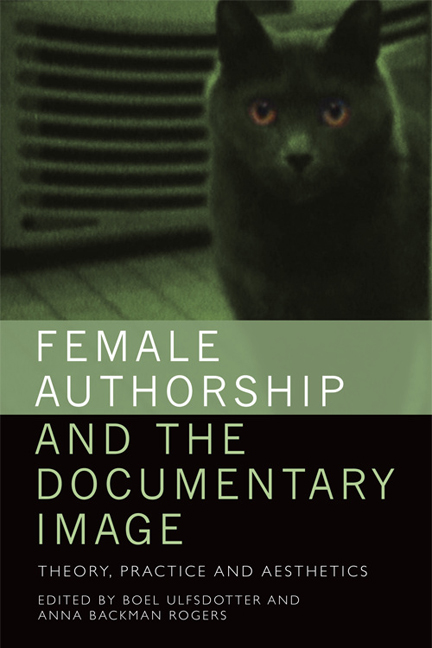Book contents
- Frontmatter
- Contents
- List of Illustrations
- Notes on the Contributors
- Foreword
- Introduction
- PART ONE DOCUMENTARY PRACTICES
- PART TWO DOCUMENTARY THEORIES
- PART THREE FEMALE AUTHORSHIP AND GLOBAL IDENTITIES
- ‘Being a Woman Documentary Maker in Taiwan’ – An interview with Singing Chen and Wuna Wu
- Select Bibliography
- Index
3 - More Than One
Published online by Cambridge University Press: 05 May 2021
- Frontmatter
- Contents
- List of Illustrations
- Notes on the Contributors
- Foreword
- Introduction
- PART ONE DOCUMENTARY PRACTICES
- PART TWO DOCUMENTARY THEORIES
- PART THREE FEMALE AUTHORSHIP AND GLOBAL IDENTITIES
- ‘Being a Woman Documentary Maker in Taiwan’ – An interview with Singing Chen and Wuna Wu
- Select Bibliography
- Index
Summary
This is a multi-vocal essay. It is an attempt to both describe, and in a sense, embody the philosophy and methodology on which I have built my practice as a new media documentary maker. The first section, The Personal is Political, looks at the relation between politics and aesthetics in conversation with Jacques Rancière, Kimberlé Williams Crenshaw, Gail Vanstone and others. In the remaining four sections, Convictions, Place, Body and Perspective, I use an essay written by Belgian Art critic, Pieter Van Bogaert, in response to an exhibition of my work at STUK Kunstencentrum, as a kind of way-finder to guide you through a body of work that examines systems of justice and punishment. Van Bogaert's essay acts as an armature which supports fragments of texts, or lexia – examples of anecdotal theory based on actual testimony taken from four documentary projects – along with various ruminations on their concerns and content.
The somewhat unusual structure and layout echo that of the non-linear and interactive documentary projects – so that here, as in the works themselves, your navigation can proceed as form of inquiry informed by multiple voices – an inquiry that provides a parallel experience to that of the author's encounter with and response to those voices. You needn't read every lexia, nor should you try to read in a particular order. The essay is a site for you to traverse. Its argument embodied in its design.
You may well wonder how the formatting of this essay is related to the focus of the collection where you find it. Does the structure make an argument about authorship that is specifically female? Possibly, but I am more concerned about the political efficacy of my work than its gendered-ness. I must admit that I have been troubled by the notion of the specificity of the female in the documentary image and authorship that the title of this publication implies. I am female, a feminist and a politically and socially engaged artist concerned principally with challenging multiple modes of oppression – social and environmental injustice, state violence, structural inequality – in which gender inequality plays a role.
- Type
- Chapter
- Information
- Female Authorship and the Documentary ImageTheory, Practice and Aesthetics, pp. 40 - 65Publisher: Edinburgh University PressPrint publication year: 2018



